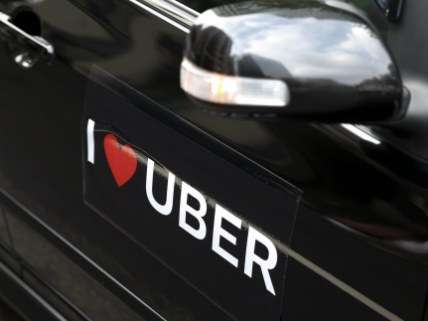San Francisco Officials Continue Attacks on Uber
City tax collector wants to post home addresses of drivers online.

The City of San Francisco filed suit last week against the ridesharing service Uber after the company filed a motion in court to block the release of a drivers' personal information. This sets up the latest battle between the city and one of the leading transportation network companies over an issue that has privacy implications beyond the ridesharing industry.
San Francisco's tax collector wants the home addresses and other information of drivers to post on a web site that includes a map that pinpoints the exact location of registered business owners in the city. Because these drivers are independent contractors, most of them use their home addresses as their official business address.
The web site is publicly searchable, which means that anyone can easily find where these drivers live. "We've asked the city to allow us to get the consent of drivers and to remove their personal information from the public web site, but they have refused," said Uber Northern California's general manager, in a statement last week.
The city's treasurer, Jose Cisneros, portrayed Uber's actions as an effort to "circumvent the tax laws that apply to all businesses in San Francisco." He notes that 130,000 other businesses—ranging from big ones such as Pacific Gas & Electric to small hairdressers—must also provide the information.
"San Francisco needs this information to determine whether Uber's drivers are complying with San Francisco's Business Registration Certificate requirement and paying annual registration fees," the city wrote in its legal brief filed in San Francisco Superior Court. In a statement, City Attorney Dennis Herrera referred to privacy concerns as a "red herring."
But critics of the city's legal approach see it as its latest effort to hobble these increasingly popular ridesharing platforms. For instance, Cisneros seemed to suggest in a statement that the dispute goes beyond a simple business-registration request, as he ticked off a variety of unrelated complaints that he has with the company.
"Once again Uber believes they are above the law," said Cisneros. "If Uber is so concerned about the financial well-being and privacy of their drivers, I recommend they raise wages, convert the contractors to employees, or push for their driver's inclusion in statewide licensing like limousine drivers."
If this is a question of registration, then why bring up pay rates or drivers' independent-contractor status or unrelated licensing issues?
The city attorney's office likewise brought up other issues. It alleges that Uber has engaged in a "pattern of obstruction" because it "has refused to share information with the San Francisco Municipal Transportation Agency about its operations, tested self-driving cars on the streets of San Francisco without a state permit, and has fought calls by the SFMTA and the San Francisco International Airport for stricter criminal background checks on its drivers."
The city attorney's office also complained that, because ridesharing companies such as Uber are regulated by the California Public Utilities Commission, it has "limited the ability of cities to provide oversight." The statement criticizes Uber for its backing of Senate Bill 182, which "would prohibit local jurisdictions from requiring a transportation network company driver to obtain more than one business license, regardless of the number of jurisdictions in which they operate," according to the Senate bill analysis.
That measure has passed two committees with little opposition. As the San Francisco Chronicle reported, drivers are concerned that myriad cities will require business licenses, which means they would have to register and pay fees in every city where they operate. There are dozens of cities in the Bay Area alone, and drivers frequently pick up passengers in, say, San Francisco and leave them off in Oakland or San Mateo. Only a handful of cities now require business licenses, but the requirement could easily spread across the region.
As the ridesharing companies' defenders point out, these statements suggest the city isn't just looking for a little registration information, but instead are pursuing broader regulatory efforts against the companies, which have shaken up the established taxicab industry.
City officials also have complained about the number of ridesharing drivers on the streets, yet if these services weren't available people would be using other types of vehicles. San Francisco officials often boast about the city's role in the New Economy, yet are taking an antagonistic approach to this emerging industry.
City officials rebut the privacy concerns by noting that drivers can provide post-office boxes or separate business addresses on the registration forms, but drivers complain that it adds costs and hassles – above and beyond the $91 annual fee the city collects from drivers. Uber officials say they've heard from thousands of drivers who have expressed concern about privacy issues.
But it's clear that the city and the transportation companies would be more likely to come up with a solution to this privacy related question if they worked together rather than battle each other. The city's broad-based critiques of Uber suggest that such a cooperative approach is unlikely to happen any time soon.
This article first appeared in Calwatchdog.


Show Comments (33)